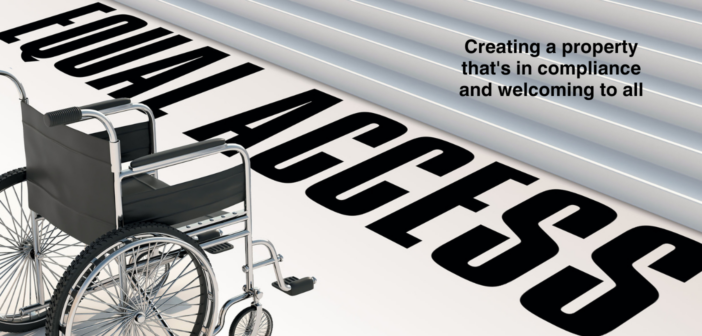Creating a property that’s in compliance and welcoming to all
Complying with the requirements of the American Disabilities Act (ADA) is essential for hotels today, but that isn’t the only reason accessibility needs to be a priority for those in the lodging industry.
“Hoteliers should want to ensure their properties emphasize accessibility because it promotes an atmosphere of inclusion that can be spread throughout the community,” said Victor Felix, director of content and compliance for BlueDAG, which provides software solutions to aid ADA compliance. “In addition, there’s an economic benefit to it as well. By not focusing on accessibility, you’re essentially limiting your client base. As a business, why would anyone want to do that? In business, accessibility equals revenue.”
Michelle Winnecke, associate principal with LCM Architects, said it just makes sense to offer “equitable space for the widest audience possible.” The number of guests who have accessibility needs is growing and includes many who weren’t born with a disability but whose needs emerged during the aging process, said Doug Anderson, partner with LCM Architects.
“The buying power of people with disabilities is a lot higher than what people might imagine,” Anderson said. “And, with the aging baby boomer population, the need for accessible rooms is increasing.”
KEY FEATURES
Felix said accessible parking and loading and unloading zones for guests are among the key ADA requirements. Anderson said accessible routes to the entrance and accessible parking requires attention to detail and vigilance as sidewalks and wheelchair ramps age and break down and lines grow faded. A fully compliant parking lot when a hotel opens won’t stay compliant without the proper attention, Anderson said. In fact, he said the No. 1 accessibility violation complaint in Illinois, where LCM is based, is parking.
Inside the lobby, hotels must consider accessibility in the check-in process. For instance, high checkin desks can create challenges for some guests, such as those who use a wheelchair. Anderson said the issue isn’t just related to reach but pertains to allowing a guest to have adequate eye contact with the person behind the desk.
Guest rooms must meet required mobility features in the sleeping space and the bathroom. For example, Felix said hotels must provide a clear floor space that runs parallel to the bed on both sides of the bed or a single space between two beds. In the bathroom, Felix said a roll-in shower that meets dimension requirements, provide controls within easy reach, while also including grab bars, is important.
Winnecke and Anderson emphasized that hotels should offer accessible rooms across their different categories of rooms. For instance, a guest who uses a wheelchair should have the ability to book a suite or standard room or a room with a balcony rather than be limited to one category. Larger resorts with many different room types are the most likely to overlook that requirement, Winnecke said. Sometimes, she said, LCM encounters hotels that have stacked all their accessible rooms in one tier and believed that would be sufficient.
Felix said technological advancements have made some requirements less prevalent than they were before.
“For example, if a payphone is provided, it must comply with accessibility requirements, even though we probably haven’t seen a payphone in years, thanks to everyone carrying a cellphone now,” Felix said. “If specific elements are provided, then the requirements that are in place still apply.”
OFTEN OVERLOOKED
Felix said the most overlooked accessibility features in hotels include communication features and equipment for individuals who have hearing impairments or who are deaf. Transient lodging facilities are required to offer guest rooms with communication features, according to the ADA.
“The required number of rooms with communication features is determined by the total number of guest rooms provided at the facility,” Felix said. “An example of such a feature would include visible notification devices for incoming telephone calls and doorbell activations.”
Felix said the most overlooked accessibility features in hotels include communication features and equipment for individuals who have hearing impairments or who are deaf.
Accessible-compliant shower chairs is another frequently overlooked detail, Anderson said, such as chairs that aren’t stable or fixed or are difficult for guests to transfer onto. Another occasional shortcoming is bathroom storage space, including where towels are located. Winnecke said LCM often encounters hotels that have its bathroom towels hanging on grab bars.
“The largest number of issues usually exist in the bathroom,” Winnecke said.

ANASTASIA AVERINA/SHUTTERSTOCK.COM
Winnecke said LCM frequently has surveyed hotels and found the operator doesn’t even have a list of their accessible rooms. Or, they can identify their accessible rooms, but they don’t understand the characteristics of them and how they might align with a guest’s needs. For instance, someone with mobility issues has different accessibility needs than someone who is deaf.
“Sometimes, the employees don’t know the difference between a mobility-accessible guest room and a guest room with communication features,” Winnecke said.
Anderson said limiting accessibility options can undermine the experiences not just of the guests who have accessibility challenges but with their fellow travelers.
“The bigger brands do a better job of keeping detailed information on their websites about the features of their accessible rooms, which helps people make informed choices,” Anderson said. By implication, this requires independent properties to be hyper vigilant about ensuring accessibility information is readily available, and easy to locate, on their websites.
CONTINUED COMPLIANCE
Anderson said compliance starts with the design of a property – both during initial construction or a renovation – and an emphasis on accessibility in that stage of the process. Once a facility is built, experts should review the property with a punch list to make sure all the accessibility features are in place. Then, Anderson said, it’s about monitoring accessible features, making sure everything is maintained and properly operating.
Once a hotel is operating, Felix said “staff training is crucial to ensuring an ongoing focus on accessibility.”
“Having staff understand how to accommodate an individual’s request for a specific type of room, and knowing if a mobile communication device is used to make a guest room comply with communication features – including making the staff aware that they even have the device and how to use it – is vital to serving clients better,” Felix said.
A change in ownership or changeover in staff can lead to successful accessibility features being forgotten or ignored.
“Continuation is important because you may have those accessible features right when it’s built or renovated, but it becomes a big problem if it isn’t maintained properly,” Winnecke said. “If you have employees who have been trained properly, and your facilities are maintained regularly, it’s much better for your guests.”
Anderson said he recalled hearing of an instance when a staff member told a guest who had arrived using a scooter as a mobility aid that he couldn’t use the scooter inside because the carpets had just been cleaned.
“That’s just training,” Anderson said. “Your first line of defense for a lot of this is making sure staff know what the requirements are when working with people with disabilities.”
Frontline staff without the proper training can place guests with accessibility challenges in the wrong rooms and then struggle to help rectify their mistake, leading to highly frustrating experiences for those guests – not to mention exposing the hotel to a raft of potential legal problems.
“Accessibility features make a world of difference to the enjoyment of a person’s hotel stay, and we’ve heard that from a lot of folks,” Winnecke said. “So, it’s important for a hotel owner to make sure that these accessibility features are provided in their hotel. You want all your guests to enjoy what you have to offer, and the difference between a so-so vacation and a great vacation for many guests is having these features available.”




